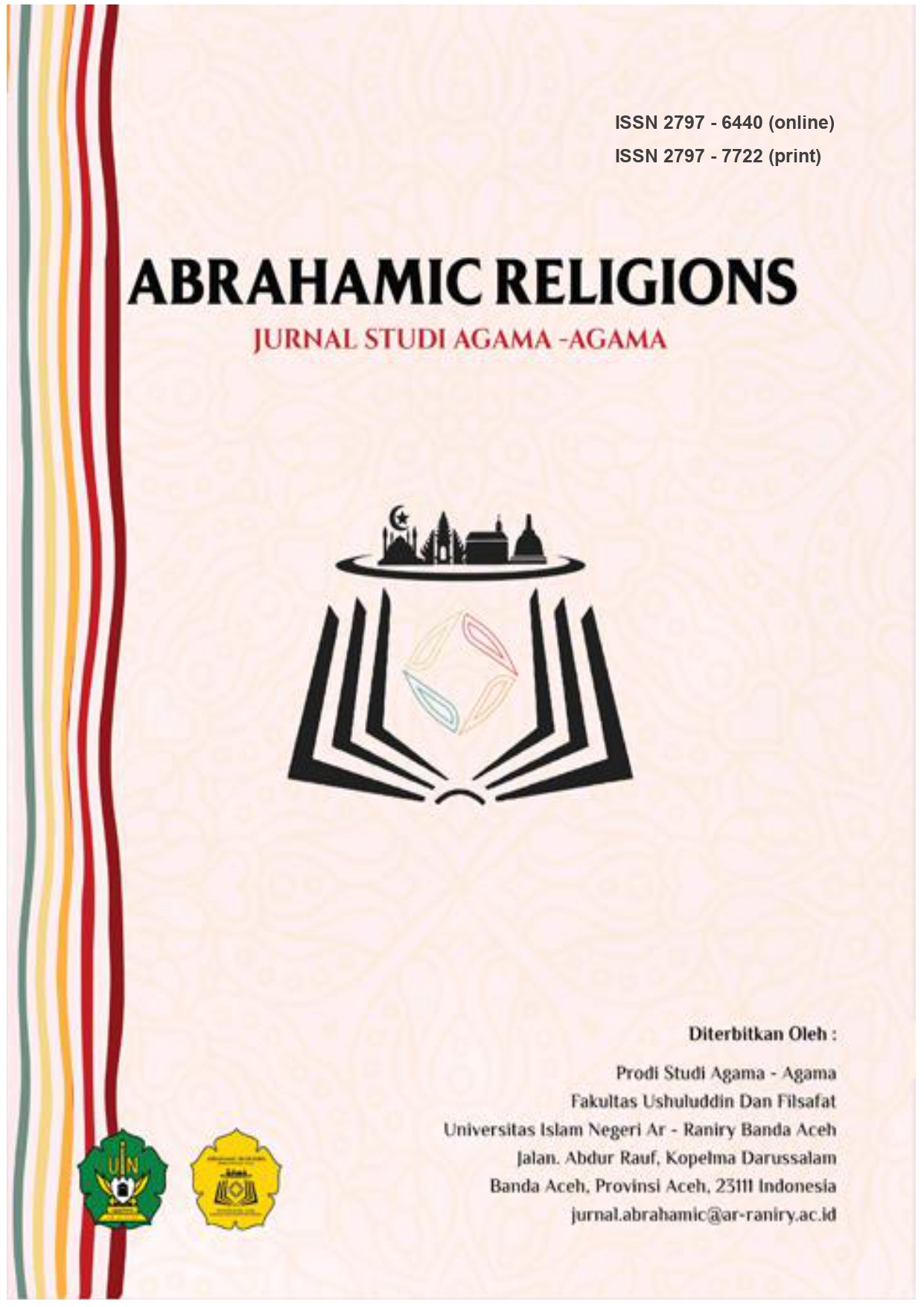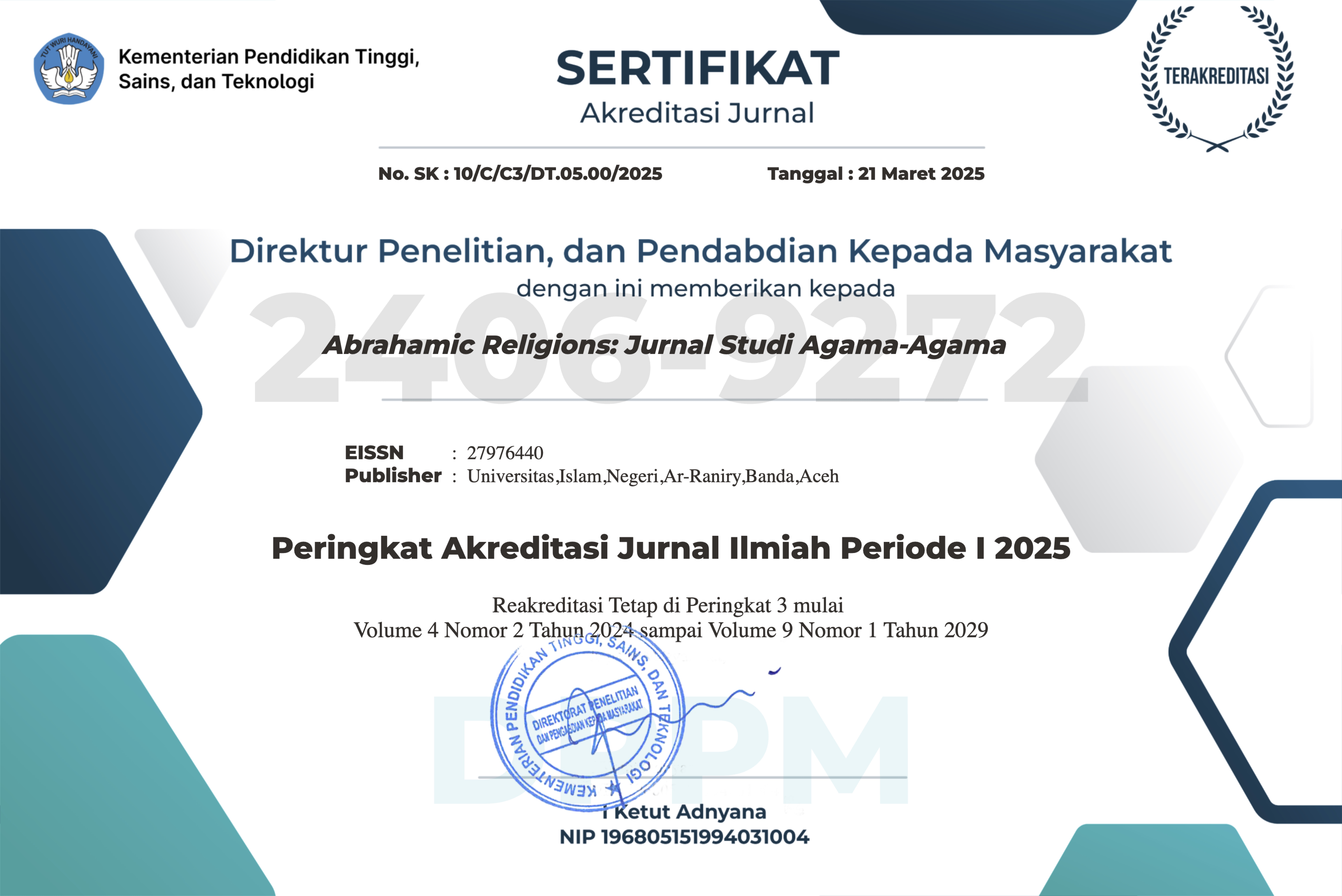Analisis Antroposentrisme Genesis: 22 dan Teosentrisme Q.S Al-Saffat: 99–113 dalam Kehidupan Sosio-Politis Arab-Israel
DOI:
https://doi.org/10.22373/arj.v3i2.19589Keywords:
Al-Saffat, 99-113, Antroposentrisme, Arab-Israel, Genesis, 22, Ishmael-IsaacAbstract
The protracted Arab-Israeli conflict, characterized by socio-political dynamics, has endured for over fifty years, pitting the Palestinian and Israeli factions against each other. The issue in question possesses historical origins, since it can be traced back to the relationship between two brothers, Ishmael and Isaac, who share a common paternal lineage. The figure of the son of Abraham being sacrificed, as interpreted in Genesis 22 and QS. Al-Saffat 99-113, is a subject of debate among both Jews and Muslims. This article aims to explore the interpretation of Genesis 22 and QS. Al-Saffat 99-113 by employing anthropocentric and theocentric perspectives. The objective of this study is to examine the interpretations of Genesis: 22 as the Jewish Ideological Basis in relation to Jerusalem, and QS. Al-Saffat: 99-113 as the Islamic Theological Base in connection to the legacy of Abraham's milah, which has had an impact on the socio-political landscape leading to the Arab-Israeli conflict in the Middle East. The biblical and Qur'anic narratives recount the tale of Abraham's progeny, who were destined for sacrifice. The anthropocentric reading of these words serves as the historical foundation for the divide of the land of the covenant, which was inherited by Ishmael, the progenitor of the Arab people, and Isaac, the progenitor of the Israelites. This study exclusively relies on library sources, encompassing interpretative literature, Old Testament texts, books, journals, notes, and reports from prior research endeavors. Moreover, this study is classified as qualitative as it yields descriptive data. The findings of this study demonstrate that the religious interpretation of the Scriptures has exerted a significant impact on cultural and political movements within the Arab-Israeli region. This influence encompasses both the ramifications of territorial conflicts and the effects of peace treaties, such as the Abraham Accord.
Abstrak
Konflik sosio-politis Arab-Israel khususnya Palestina versus Israel telah terjadi lebih dari setengah abad. Perseteruan ini memiliki akar historis sejak dari dua saudara terasing yang memiliki ayah yang sama, Ismael dan Ishak. Keduanya diperdebatkan oleh Yahudi dan Muslim sebagai sosok anak Ibrahim yang hendak dikurbankan dalam penafsiran Genesis : 22 dan QS. Al-Saffat : 99-113. Artikel ini akan membahas tentang penafsiran Genesis : 22 dan QS. Al-Saffat : 99-113 tersebut melalui pendekatan antroposentrisme dan teosentrisme. Tujuan penelitian ini adalah untuk menganalisis proyeksi penafsiran atas Genesis : 22 sebagai basis Ideologis Yahudi terhadap Jerussalem dan QS. Al-Saffat : 99-113 sebagai basis teologis Islam terhadap warisan millah Ibrahim yang berpengaruh dalam kehidupan sosio-politis hingga memunculkan konflik Arab-Israel di Timur Tengah. Unit analisa dalam penelitian ini adalah ayat-ayat Alkitab dan Al-Qur’an tentang kisah anak-anak Ibrahim yang hendak dikurbankan. Interpretasi antroposentris terhadap ayat-ayat tersebut menjadi akar historis pembagian tanah perjanjian yang diwariskan kepada Ismael —sebagai bapak bangsa Arab— dan Ishak—sebagai bapak bangsa Isreal—. Penelitian ini sepenuhnya merupakan penelitian pustaka yang menggunakan sumber kepustakaan baik berupa kitab tafsir, teks-teks Perjanjian Lama, buku, artikel, catatan, maupun laporan karya terdahulu. Di samping itu, penelitian ini bersifat kualitatif karena menghasilkan data deskriptif. Hasil pembahasan dari penelitian ini menunjukkan bahwa interpretasi kitab suci sebagai basis ideologi agama berpengaruh pada gerakan budaya dan politik secara umum, khususnya di kawasan Arab-Israel, baik pengaruh berupa konflik perebutan wilayah maupun pengaruh berupa perjanjian perdamaian seperti Abraham Accord.
References
az-Zuhaili, P. D. W. (2021). Tafsir al-Munir Jilid 11: Aqidah, Syariah, Manhaj (Juz 21-22 al-’Ankabuut - Yaasiin). Gema Insani.
Beinin, J., & Hajjar, L. (2014). Primer on the Arab-Israeli Conflict. The Middle East Research & Information Project. https://teachmideast.org/articles/primer-arab-israeli-conflict/
Boslaugh, S. E. (2023). Anthropocentrism. Human-Centered Philosophy & Ethics. Britannica. https://www.britannica.com/topic/anthropocentrism
Geovasky, I. (2011). Kristologi Yang Bersahabat Terhadap Alam Ciptaan: Memandang Yesus Bersama Dengan Segenap Alam. Gema Teologi, 35(1/2), Article 1/2. https://journal-theo.ukdw.ac.id/index.php/gema/article/view/130
Halim, I. A. (2017). Agama Yahudi sebagai Fakta Sejarah dan Sosial Keagamaan. Religious: Jurnal Studi Agama-Agama Dan Lintas Budaya, 1(2), Article 2. https://doi.org/10.15575/rjsalb.v1i2.1392
Haynes, J. (2017). Religion in Foreign Policy. Dalam Oxford Research Encyclopedia of Politics. https://doi.org/10.1093/acrefore/9780190228637.013.380
Hegel, G. W. F. (1988). Lectures on the Philosophy of Religion. University of California Press.
Hennry. (2018). (12) Kitab Kejadian. Biblical Reformed Books. https://bibleandbookministry.com/id/book/genesis/
Hurd, E. S. (2008). The Politics of Secularism in International Relations. Princeton University Press. https://www.jstor.org/stable/j.ctt7s5nn
Jabr, M. I. (2005). Tafsīr Mujāhid (I). Dar al-Kutub al-Ilmiyah.
Jørgen, J. (2023). Israel and the Abraham Accords: A Failed Expansion. MidEast Policy Brief. https://www.prio.org/publications/13498
Kopnina, H., Washington, H., Taylor, B., & J Piccolo, J. (2018). Anthropocentrism: More than Just a Misunderstood Problem. Journal of Agricultural and Environmental Ethics, 31(1), 109–127. https://doi.org/10.1007/s10806-018-9711-1
Levy, D. (2020, September 17). The Missing Peace in the Abraham Accords. The American Prospect. https://prospect.org/api/content/d63e6fe8-f885-11ea-9c10-1244d5f7c7c6/
Lynfield, B. (2022, Januari 31). Israel’s Rewarding Road to Normalization. Foreign Policy. https://foreignpolicy.com/2022/01/31/israel-abraham-accords-normalization-middle-east/
Mahmud, B. U. A.-Z. (2009). Al-Khasyaf ’An Haqaiq At-Tanziil Wa ’Uyun Al-Aqaawil Fii Wujuh At-Ta’wiil. Dar al-Ma’rifah.
Majmu Al-Fatawa. (1980). معنى قوله صلى الله عليه وسلم: (أنا ابن الذبيحين). https://binbaz.org.sa/fatwas/8748/معنى-قوله-صلى-الله-عليه-وسلم-انا-ابن-الذبيحين
Mirza, Y. Y. (2018, Juni 6). Depicting Abraham’s Sacrifice: Differing Biblical and Islamic Textual Traditions. Maydan. https://themaydan.com/2018/06/depicting-abrahams-sacrifice-differing-biblical-islamic-textual-traditions/
Neuwirth, R. (2020). The Israeli-Arab Conflict: A Spiritual Perspective. Tradition Online. https://traditiononline.org/the-israeli-arab-conflict-a-spiritual-perspective/
Rad, G. von. (1984). The Problem of the Hexateuch and Other Essays. SCM.
Rijkers, G. (2020, Juni 12). Tanah Bagi Keturunan Ismael Menurut Alkitab. Fakta Israel. https://faktaisrael.com/tanah-bagi-keturunan-ismael-menurut-alkitab/
Schumacher, M. J. (2023). A holy peace: Religious values, collective identity, and the future of the Palestinian–Israeli conflict. Peace & Change, 48(1), 21–38. https://doi.org/10.1111/pech.12574
Shihab, M. Q. (2012). Tafsir Al-Misbah; Pesan, Kesan, dan Keserasian Al-Qur’an: Vol. XII (V). Lentera Hati.
Silk, M. (2015). The Abrahamic Religions as a Modern Concept. Dalam A. J. Silverstein & G. G. Stroumsa (Ed.), The Oxford Handbook of the Abrahamic Religions (hlm. 0). Oxford University Press. https://doi.org/10.1093/oxfordhb/9780199697762.013.27
Soliman, M. (2021, Juli 28). An Indo-Abrahamic alliance on the rise: How India, Israel, and the UAE are creating a new transregional order. Middle East Institute. https://www.mei.edu/publications/indo-abrahamic-alliance-rise-how-india-israel-and-uae-are-creating-new-transregional
Stol, M. (2016). Vrouwen van Babylon: Prinsessen, priesteressen, prostituees in de bakermat van de cultuur Terj. Helen dan Mervyn Richardson. Deutsche Nationalbibliothek.
Sulaiman, M. bin. (2002). Tafsir Muqatil bin Sulaiman (Vol. 1). Muassisat al-Tarikh al-Arabi.
Downloads
Additional Files
Published
Issue
Section
License
Authors who publish in this Journal agree to the following terms:
- Authors retain copyright and grant the journal right of first publication with the work simultaneously licensed under Attribution-ShareAlike 4.0 International (CC BY-SA 4.0) allows others to share the work with an acknowledgment of the work's authorship and initial publication in this journal.
- Authors are able to enter into separate, additional contractual arrangements for the non-exclusive distribution of the journal's published version of the work (e.g., post it to an institutional repository or publish it in a book), with an acknowledgment of its initial publication in this journal.
- Authors are permitted and encouraged to post their work online (e.g., in institutional repositories or on their website) prior to and during the submission process, as it can lead to productive exchanges, as well as earlier and greater citation of published work. (See The Effect of Open Acces)















